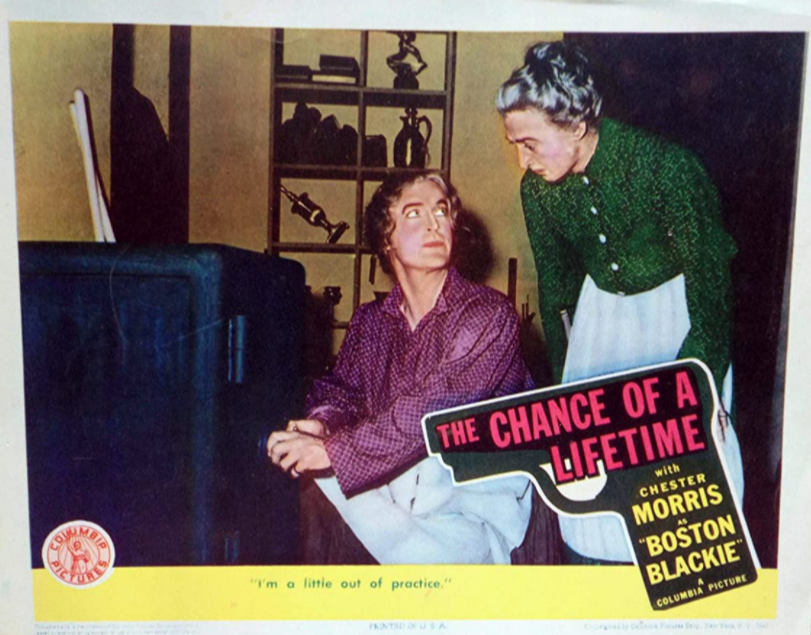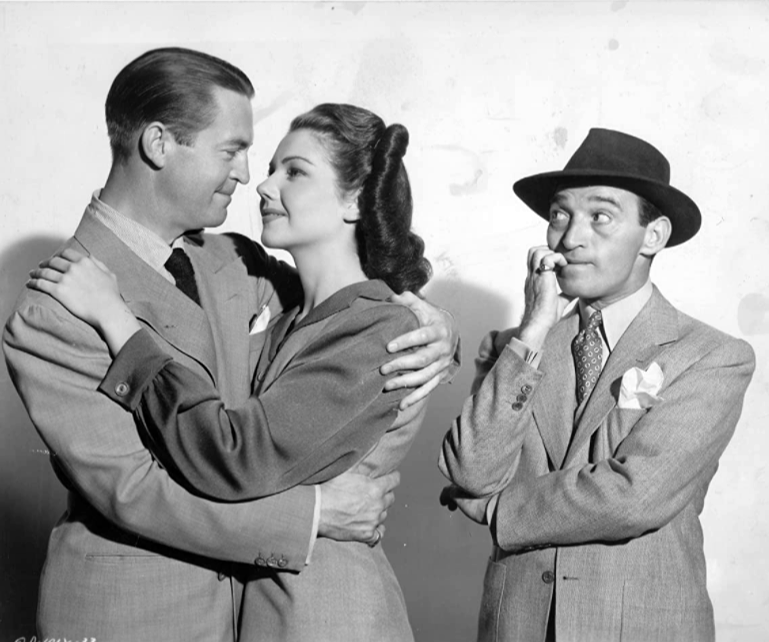Review: The Chance of a Lifetime (1943)
Posted by Ivan G. Shreve, Jr. on Jun 14th 2014
With the manpower shortage during World War II, reformed safecracker-jewel thief Horatio “Boston Blackie” Black (Chester Morris) apparently feels that Rosie the Riveter can’t do it alone in this nation’s defense plants. That’s why Blackie has persuaded Governor Rutledge (Pierre Watkin) to parole twelve convicts into his custody, men who will then be employed at a tool factory owned by his wealthy pal Arthur Manleder (Lloyd Corrigan). As is to be expected, Blackie’s cop nemesis, Inspector Farraday (Richard Lane), is convinced that this noble social experiment will backfire on B.B…thus granting him his most fervent wish to stick Blackie behind bars a second time.
Farraday isn’t right about too many things, but his instincts are on the money where Blackie’s fellow cons are concerned. It only takes one bad apple to spoil the whole barrel, and in this particular case it’s Dooley Watson (Erik Rolf), a con who Blackie agrees to grant temporary leave to see his wife Mary (Jeanne Bates) and son Johnny (Larry Joe Olsen) before reporting to work in the morning. Dooley hasn’t exactly come clean about his true intentions: convicted for his participation in a robbery that netted him a nifty $60,000, he recovers the stashed loot and is planning to light out with his family before the men who assisted him on that job show up with their hand out for their cut. Sure as you’re born, “Red” Taggart (John Harmon) and “Nails” Blanton (Douglas Fowley) enter the picture…and in a scuffle with the two hoods, Dooley winds up shooting and killing Taggart.
Blackie arrives too late to keep Dooley from making that mistake…even though he killed Taggart in self-defense. So our hero agrees to take the rap for Dooley while at the same time engaging in the search for Blanton, who vamoosed after seeing his partner slump to the floor. With the help of his loyal sidekick The Runt (George E. Stone), Boston Blackie eludes Farraday and Sergeant Matthews (Walter Sande) through a number of comical escapades—several of which necessitate Blackie’s penchant for disguises.
Part of a formula that continued to be entertaining even in the weaker entries of Columbia’s Boston Blackie franchise, The Chance of a Lifetime (1943) is a briskly engaging programmer whose fortunes at the box office weren’t quite as rosy as earlier outings in the series. This might have proven to be a setback for the man who made Lifetime his feature film debut as director, but the studio recognized that young William Castle showed a lot of promise and assigned him to future pictures including four from Columbia’s successful Whistler franchise (based on the radio series)—The Whistler (1944), The Mark of the Whistler (1944), The Power of the Whistler (1945), and Mysterious Intruder (1946). Castle left the studio in 1947 to pursue a more independent directorial career (though he did return briefly in the 1950s for a few films) and he’s best known for a series of horror movies in the 50s/60s popularized with “gimmicks” to put audiences in the seats: The Tingler (1959), 13 Ghosts (1960), Mr. Sardonicus (1961), etc. Castle’s most successful movie project was Rosemary’s Baby (1968); as producer of that seminal horror classic, Bill had shrewdly purchased the film rights from author Ira Levin but was asked not to direct the movie by Paramount for fear that his “schlock” reputation would have damaged the project.

The title, The Chance of a Lifetime, seems rather fitting for a novice director; Castle later claimed that his first feature film was a hopeless project and that he simply re-arranged the reels in the editing room to make Lifetime “work.” I personally think Bill is engaging in a little fiction here; it’s unquestionably coherent and while Lifetime isn’t nearly as splashy as some of his later horror efforts, it’s a first-rate job from a clearly talented filmmaker…even though the finished product sometimes feels as if the people involved were just punching a time clock to get the job done. The most amusing aspects of Lifetime involve Blackie’s donning disguises to avoid capture by Farraday; it’s a practice that the amateur sleuth engaged in previously in Confessions of Boston Blackie (1941) and Boston Blackie Goes Hollywood (1942), but masquerade is the order of the day on three different occasions in Lifetime. First, Blackie and The Runt pose as carpet installers to get access to Nails’ apartment, and then later our hero pretends to be a cop (with a brogue as thick as Irish stew—The Runt plays the World’s Oldest Messenger Boy) while plying two cleaning ladies with strong drink. With the charwomen plastered, Blackie and Runt then don drag in order to locate a safe in the police station where the $60,000 from the robbery has been stored for (pardon the pun) safekeeping.
Scripted by Paul Yawitz, The Chance of a Lifetime is well-stocked with a number of familiar character faces you might recognize from classic films and television: Bonanza sheriff Ray Teal is one of the cops that Blackie fools with his carpet installer costume, and two of the paroled convicts are played by Arthur Hunnicutt and Sid Melton (of Make Room for Daddy and Green Acres fame). (Old-time radio veteran Jeanne Bates is also on hand, as Dooley’s concerned wife.) Other familiar performers include Richard Alexander, Trevor Bardette, Heinie Conklin, Minta Durfee, Douglas Fowley, Forbes Murray, John Tyrrell and Pierre Watkin.
Sadly, Lifetime is the final Boston Blackie film for two actors playing the series’ supporting characters. It’s the last go-round for Cy Kendall as Blackie’s informer pal Jumbo Madigan (Joe Crehan takes over the role in the next Blackie, One Mysterious Night) and the swan song for Walter Sande as the stupefyingly dense Detective Sergeant Matthews. The Matthews character would be played by Lyle Lattell in Night, and then Frank Sully inherited the role for the remaining entries in the franchise. (Interestingly, Matthews appeared to get dumber and dumber with each new actor in the role.)

While I’m on the topic of One Mysterious Night—that’s the next Boston Blackie film I’ll be covering in our monthly spotlight on the Radio Spirits blog; like previous entries directed by Castle, Michael Gordon and Edward Dmytryk, Night allowed a future director the opportunity to show his stuff with his first credited feature. (Night is also one of only three Boston Blackie movies available on DVD as part of Sony/Columbia’s Manufactured-On-Demand Collection…so you might want to rent it in case there’s a quiz next time.) Don’t forget: our Radio Spirits collection Boston Blackie: Outside the Law would make the perfect gift for the old-time radio fan in your family (and would keep the rest of your RS collections company on the shelf!).

